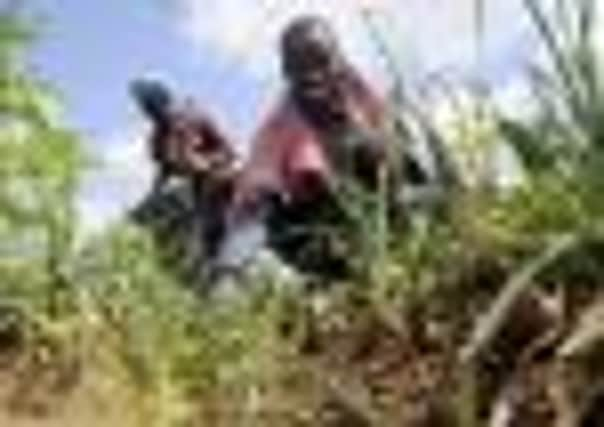2012 to see Scotland gain status of Fairtrade country


Now, it is a multi-billion pound operation – supporting thousands of vulnerable manufacturers and growers worldwide.
Scotland is on track to become the world’s second Fairtrade Nation – following in the footsteps of Wales, which was granted the status in 2008.
Advertisement
Hide AdAdvertisement
Hide AdAlready boasting a large number of towns and cities with Fairtrade status, ministers and the Scottish Fairtrade Forum expect the official Fairtrade Nation status to be granted later this year.
The move will raise the awareness of Fairtrade products in Scotland, the Forum hopes, and get as many Scots involved in the initiative as possible.
Products marked as Fairtrade guarantee a certain standard for those who work to produce them – from safe working conditions to a ban on child labour, equal rights for women and a fair price for producers to ensure they receive a living wage.
Across the country, 64 Scottish towns have already either achieved Fairtrade status or have active steering groups, while almost two-thirds of higher education institutions and 171 schools have already achieved the standard.
Fiona Hyslop, cabinet secretary for culture and external affairs, said: “It is encouraging to see good progress being made across all walks of life in Scotland, whether that is in our schools, colleges and universities, churches or within central and local government. The Scottish Government is committed to raising awareness and promoting the fair-trade agenda throughout Scotland and I am confident that later this year, Scotland will become a Fairtrade Nation.
“Scotland has always been an outward-looking, innovative and caring nation. The global fight against poverty and inequality is no different and it is important that Scots are active both at home and overseas in this fight.”
UK-wide, Fairtrade sales totalled £1.32 billion in 2011 according to the latest figures from the International Fairtrade Association, which names the UK as one of its biggest markets.
In Edinburgh, the One World Shop, next to St John’s Church at the west end of Princes Street, sells only Fairtrade goods – from tea and coffee to handbags and gift products.
Advertisement
Hide AdAdvertisement
Hide AdThe shop, which was launched 30 years ago as a stall selling fair trade products at the church itself, sold its first officially certified Fairtrade product in 1994 – Green and Black’s Maya Gold Chocolate, produced in Belize.
Now part of confectionary giant Cadbury’s, all of the company’s products remain Fairtrade – although the corporate nature of the brand has perhaps dented its flagship Fairtrade status, with Divine chocolate having overtaken it as the iconic Fairtrade confectionary.
“The whole movement has grown from a series of small initiatives here and there in the 1980s, which were mainly borne out of political motivations,” said One World Shop business manager Rachel Farey, who has been involved with the organisation since 1985, pointing to early projects that worked to support people in Nicaragua and Chile. “Fairtrade wanted to support small communities which were struggling.
“I think it all really took off in the mid-1990s when the Fairtrade Foundation was set up and Cafe Direct was launched.”
Cafe Direct was founded 20 years ago by Oxfam, Traidcraft, Equal Exchange Trading and Twin Trading as a response to the 1989 global collapse in coffee prices.
“Now people are moving more towards wanting to know where their food has come from,” she added. “And while they might be concerned about food miles and so on, they know we don’t grow, for example, coffee in the UK, so Fairtrade is the next best thing.”
Now major brands, including KitKat, Tate & Lyle sugar and many of the Cadbury’s Dairy Milk range, have jumped on the Fairtrade band wagon. Maltesers are next to be granted Fairtrade status after taking measures such as saying it intends to buy 100 per cent of its cocoa from sustainable sources by 2020.
“What is great is that since the early years, a lot of big brands have got on board in recent years and made a lot of their products Fairtrade,” said Martin Meteyard, chairman of the Scottish Fairtrade Forum, which hopes to announce Scotland’s new status in the next few months.
Advertisement
Hide AdAdvertisement
Hide Ad“For Scotland, we are hopeful that we will become the second Fairtrade Nation – and that a lot of other countries will follow in our footsteps – but we have a lot to do to make sure we reach the criteria.”
Fair Isle has been granted Fairtrade status, as have smaller communities on Orkney.
“I’m delighted that we have managed to grow this movement as far as the nooks and crannies of Scotland,” added Mr Meteyard. “We never really imagined that it would take off to the extent it has in terms of Fairtrade products being so readily available.”
Scottish Government funding earlier this year allowed for the appointment of a Fairtrade Towns Development Officer at the Scottish Fairtrade Forum, who is working with a further 12 towns including Bearsden and Dunblane to set up Fairtrade groups in the next few weeks.
“At one point it was seen as a niche thing, but I think the whole attitude towards it has changed,” said Mr Meteyard. “It has become much more mainstream and is just seen as a different way of doing business.”
He added: “We have been into primary schools all over Scotland and it is amazing how much primary school children know about it already. To them, it’s a no-brainer – of course you should treat people fairly.”